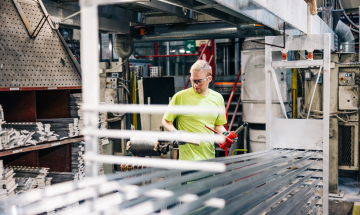Outlook brightening up – export-led labour market model to support growth
The turnover of technology industry companies in Finland totalled more than EUR 68.5 billion in 2016. This is almost one per cent higher than in 2015.
The number of new orders received by technology industry companies between October and December was up by almost 25 per cent from the preceding quarter. At the end of December, the value of order books was two per cent higher than at the end of September.
“Expectations of an improved outlook are encouraged by the increase in the number of requests for tender received by companies towards the end of 2016. Competitiveness determines the extent to which these translate into actual orders,” says Jorma Turunen, the CEO of the Federation of Finnish Technology Industries.
“Judging from order trends in recent months, the turnover of technology industry companies in early 2017 is expected to be higher than in the corresponding period last year,” Turunen estimates.
Technology industry recruited more than 28,000
The number of personnel employed by technology industry companies in Finland continued to fall slightly in 2016. Personnel declined by some one per cent, or by 2,500 employees from the average number in 2015. On average, the industry employed 286,000 people in 2016.
Despite the reductions, technology industry companies recruited a total of 28,500 employees last year. Of these, 7,300 were recruited in the October–December period. Some companies were increasing their personnel, while others were hiring new employees due to retirements and employee turnover.
“Half of the new recruits have an academic qualification and half a vocational qualification. During the vocational education reform, it is important to make sure that training is able to meet the qualitative and quantitative needs of our export industry even better and in a more flexible manner,” Turunen emphasises.
Major projects have a long-term impact
The large ship orders in Turku, increased car manufacturing in Uusikaupunki and the new pulp mill in Äänekoski will have a gradual effect on exports between 2017 and 2019.
“Overall, they are expected to increase goods and services exports from Finland by 4.5 per cent, or EUR 3.5 billion, between 2016 and 2019. The increase will be 1.5 per cent per annum,” estimates Jukka Palokangas, Chief Economist at the Federation of Finnish Technology Industries.
Labour market facing exceptional responsibility
According to Eeva-Liisa Inkeroinen, Executive Vice President at the Federation of Finnish Technology Industries, it is of utmost importance that export industry unions succeed in creating a new labour market model. We need to reform the operation of our labour market to create conditions for sustainable growth of exports.
“Anyone who is worried about employment in Finland has a reason to hope that the ongoing negotiations on the new labour market model are successful. It is also essential that the model adopted by export industry unions will guide other sectors’ negotiations, promoting stable economic development and the competitiveness of production in Finland.”
She emphasises the responsibility of social partners at an economic turning point.
“Finnish economy is still in dire straits, and the outlook remains uncertain for a number of reasons. In this situation, the labour market has to bear an exceptional responsibility for economic development. It is also important to remember that individual companies are in very different situations,” Inkeroinen underlines.
Exports key to growth, also for smaller businesses
Increasing internationalisation and seeking growth from exports is the only possible direction for Finnish companies. Harri Sjöholm, Chairman of the Board of Directors at Robit Plc, reveals the recipe for success: good products and services, special emphasis on sales and marketing as well as effective production and logistics. And all of this at a competitive price.
Sjöholm does not consider that Finland has any significant advantages. Every business has to deal with international competition every day, even if they only have domestic operations.
“Automation is the key to keeping production cost factors competitive in Finland. Digital technologies provide opportunities to improve productivity,” Sjöholm emphasises.
Further information:
Jorma Turunen, CEO, tel. +358 500 445 444
Eeva-Liisa Inkeroinen, Executive Vice President, tel. +358 400 894 220
Jukka Palokangas, Chief Economist, tel. +358 40 750 5469
Harri Sjöholm, Chairman of the Board of Directors, Robit Plc, tel. +358 400 622 092


